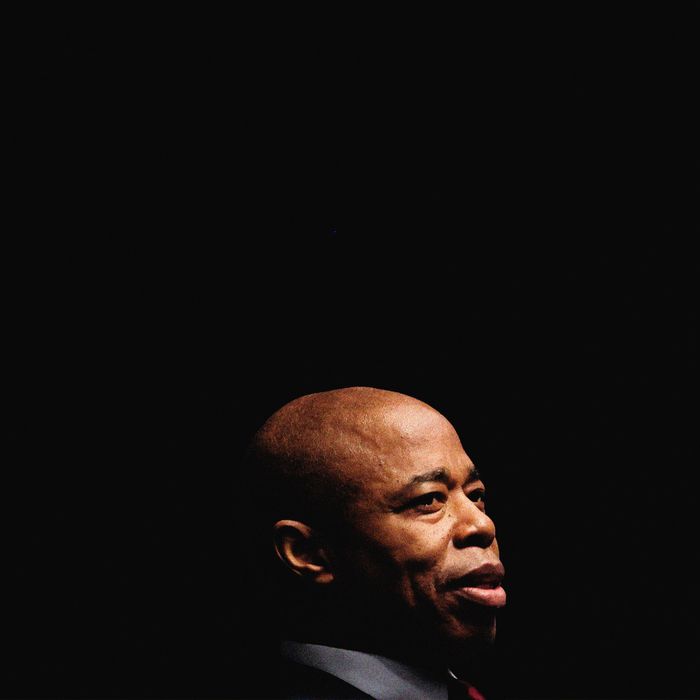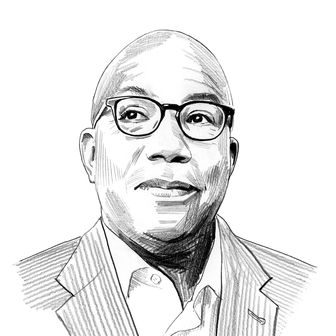
Just ahead of his 100th day in office, Mayor Eric Adams got ahead of the milestone by posting up in front of a camera in the Blue Room at City Hall and cheerfully hopping in and out of quickie television interviews on the city’s morning news programs. In each case — given about six minutes apiece — different anchors asked the mayor to grade his performance. Not surprisingly, Hizzoner concluded that the city is improving, he’s doing a pretty darn good job, and his grade should be an Incomplete.
“We’re seeing a great recovery,” he told WABC.
“We’re laying the foundation to move our city in the right direction,” he said on Fox 5 News.
“I am a tough grader and I am impatient,” he stated on NY1.
It was the equivalent of bumping into a friend at a cocktail party who asks how things are going on the job. If you only have a few seconds to chat, you smile and say, Doing okay, everything’s good, can’t complain and move on.
But if you have 30 minutes instead of 30 seconds, the conversation is likely to include a lot more substance, texture, and headaches. That’s when you get to confide and complain about unreliable subordinates, unscrupulous rivals, key indicators pointing to trouble ahead, and that long-planned company restructuring that might not work out.
Given more time to talk with the mayor, the main question would be an exploration of the administration’s slogan of #GettingStuffDone. Adams, charming and adept at changing the subject, has still not fully answered the question: What stuff?
In February 2021, at the height of the campaign for mayor, Adams released “100 Steps Forward for NYC,” a campaign document that laid out specific actions the candidate would take if elected. Not long after the inauguration, according to Gotham Gazette, the campaign website yanked the document, but not before the Gazette downloaded it and reproduced the promises verbatim on its website.
Some of the 100 steps have already been taken, like getting more uniformed officers out of desk assignments and onto street patrols and the appointment of a chief efficiency officer to streamline and coordinate government services, along with a newly digitized version of the mayor’s Management Report, a legally required update on how city agencies are performing.
But the 100 steps include a few bold items we haven’t heard much about, such as raising $1 to $2 billion a year by imposing a “recovery share” via an income tax surcharge on New Yorkers who earn more than $5 million a year. Even before the election, Adams was giving out a slightly different message about needing and welcoming ultrawealthy New Yorkers and hoping they don’t leave the city. So is he still planning to tax them?
There’s also a call in the 100 steps to raise $8 billion for the New York City Housing Authority by selling off the air rights over public-housing developments, a potentially transformative move that some advocates would surely condemn as a step toward privatization.
Adams promised a weekly tax holiday with the sales tax suspended every Tuesday, and a two-year hiring freeze on city workers as a cost-saving measure and to lower the cost of building inspections by using drones.
Even on the mayor’s signature issue, public safety, there was a startling promise: “The NYPD keeps its own ‘monitoring list’ of cops with records of complaints and violent incidents,” the 100 steps document states. “We will make it public to be transparent and build trust.”
New Yorkers will love or hate many of these mostly forgotten proposals. Either way, we have a right to know — and the administration needs to decide — whether these ideas are marching orders for the deputy mayors and commissioners, or if some, most, or all of them have been adjusted, canceled, or superseded by reality.
There’s also the nagging question of how different proposals fit together. Adams has been eloquent and adamant about changing state laws to make it easier for judges to order pretrial detention for criminal defendants. But more people being remanded means more bodies sent to Rikers Island, a disaster zone where 16 people died last year and 3 more have perished so far in 2022.
Last week, members of the House Oversight Committee, chaired by Representative Carolyn Maloney of Manhattan, sent a harshly worded letter to Adams about Rikers Island, ominously warning that “conditions raise Eighth Amendment and civil rights concerns that may need to be addressed through federal action.” The letter follows a recent report by a court-appointed monitor, which has issued thinly veiled warnings that a full federal takeover of the system could happen if conditions at the jail don’t improve.
On the hot-button issue of dispersing encampments of homeless people, there’s a yawning gap between promises and reality.
“It’s not that we’re kicking them out in the subway system. We’re being humane,” Adams said on Friday. “There’s nothing dignified about allowing people to live in tents or live homeless on the subway system, not having access to showers, food, health care. We’re turning that around.”
But are they? The city says more than 200 encampments have been cleared out, but only a handful of individuals living in them (five, according to Fox 5) appear to have accepted offers to enter city-run shelters, which is a comment on the safety problems — from COVID to fears of robbery and assault by fellow residents — in municipal shelters.
“Those congregate shelters are death traps. They’re not a place that we want to go in,” is what Shams DaBaron, the advocate and self-styled Homeless Hero told me. “Many of us who are in the streets, we go there because of the dangers that are in those congregate shelters; we’ve been in those experiences. Being a part of the shelter system traditionally has been a dehumanizing process.”
So the end of this first (and admittedly arbitrary) grading period shows a mayor whose dogged public cheerfulness belies a set of devilish challenges that will emerge and ripen in the next 100 days. Adams says he’s ready to get on with it. “When you are doing what you love, you’re not working — you are living out your true purpose,” he said. “I feel this is my purpose: to make this city a safe place to raise children and families.”






























